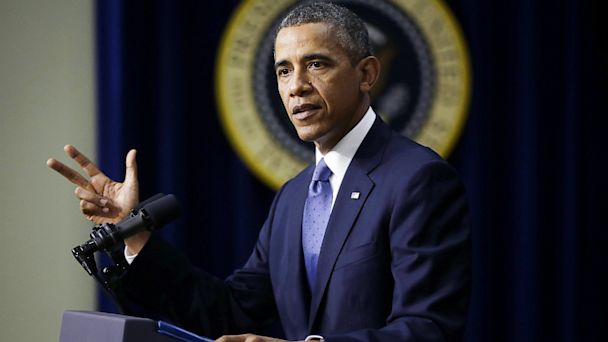High Stakes for Obama Diplomacy at UN Meeting

Pablo Martinez Monsivais/AP Photo
WASHINGTON - President Obama arrives in New York City today for what could be two of his biggest days of international diplomacy since taking office.
At the United Nations General Assembly, Obama will attempt to seal a deal on a resolution to destroy Syria's chemical weapons, nudge along newly-resumed Israeli and Palestinian peace talks, tame anger among allies about NSA spying, and possibly test a new dialogue with Iran.
The potential for historic breakthroughs on several fronts has raised the stakes for Obama at the U.N. meeting, and added an element of suspense to what is normally a scripted and often sleepy annual affair.
Generating the greatest buzz is a potential Obama meeting with Iranian President Hassan Rouhani, a newly-elected moderate, who's making his U.N. debut and has been on a charm offensive with western media.
Both leaders have expressed openness to new dialogue, talking publicly in recent days about letters they exchanged earlier this year.
An American president and Iranian head of state have not met since 1977. And while the White House says no meetings are planned, administration officials have sent unmistakable signals that one remains a very real possibility.
"As a general matter, we've consistently made clear that we're open to bilateral discussions with the Iranians at a range of levels," deputy national security adviser Ben Rhodes said on Friday. "Frankly, that's a position that the president has taken since he ran for this office in 2007. But there's not anything currently planned."
Any discussion, U.S. officials have said, would alone not be able to settle longstanding differences over Iran's nuclear program or temper economic sanctions that the Iranian government has said it wants lifted. But it could open the door to further talks.
Any one-on-one encounter between U.S. and Iranian officials at the U.N. would be a remarkable shift from recent years, when the U.S. delegation has walked out in protest during then-President Mahmoud Amedinejad's speech.
Most of Obama's focus during the U.N. Assembly will be on the crisis in Syria and his efforts to finalize a Security Council resolution that will hold Assad to account for his promised surrender of chemical stockpiles. Russia, which helped broker a tentative deal on Syria with the U.S. earlier this month, has been opposed to any language appearing to authorize the use of force as a penalty.
"In order to have a credible process where the actions of the Assad regime can be monitored, can be verified, and that there can be consequences for their non-compliance, we want to have a U.N. Security Council resolution," Rhodes said.
"Given the urgency, what we've said is this is the type of thing that needs to be completed in weeks, not months," he added, stopping short of setting a hard deadline.
Obama plans to make his case for a resolution in his address before delegates on Tuesday. He will also speak more broadly about the Syrian civil war and other recent upheaval in the Middle East and North Africa, aides said. The exodus of Syrian refugees and ensuing humanitarian crisis is expected to top a bilateral meeting with Lebanese President Michel Suleiman on Tuesday.
Obama is also expected to meet with Palestinian President Mahmoud Abbas on Tuesday, their first opportunity to discuss the status of direct talks with Israelis that the U.S. helped jumpstart earlier this year.
The president will be joined in New York by first lady Michelle Obama. The couple are scheduled to attend a private reception for the U.S. mission to the United Nations later tonight at the Waldorf Astoria before hosting a private gala for visiting leaders and dignitaries in the same hotel.
Obama kicks off his fifth U.N. visit with a bilateral meeting with Nigerian President Goodluck Jonathan and hosts an afternoon roundtable discussion on how to bolster civil society in places ruled by authoritarian regimes.